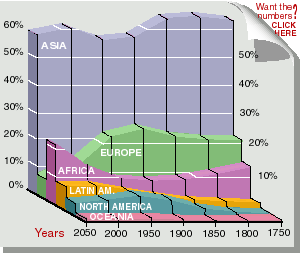Supplementary
Web Reading: The Political Sphere
Benjamin R. Barber,
"Jihad
vs. McWorld," The Atlantic Monthly, March
1992. The author
believes that both tribalism and globalism pose challenges to
democracy. A thought-provoking
classic.
John Lewis Gaddis,
"Living
in Candlestick Park," The Atlantic Monthly,
April 1999. From the introduction: "In the twenty-first
century geopolitics
might well take
its metaphors from geology, as the state system of international
relations gets
shaken to its foundations."
Thomas E. Graham,
Jr., "A
World Without Russia?" Jamestown Foundation
Conference, Washington,
DC June 9, 1999. A detailed scholarly inquiry into
the broader implications
of the Russian transformation.
C. John Ickenberry,
"Why
Export Democracy?" The Wilson Quarterly,
Spring 1999. From
the introduction: "The American promotion of democracy
abroad, particularly
as it has been pursued since the end of World War II,
reflects a pragmatic,
evolving, and sophisticated understanding of how to
create a stable
and relatively peaceful world order."
Robert D. Kaplan,
"Hoods
Against Democrats", The Atlantic Monthly,
December 1998.
Is the rapid growth of organized crime in many formerly
communist countries
a direct result of the transition to democracy?
Kaplan, Robert. "Was
Democracy Just a Moment?" The Atlantic Monthly,
December 1997.
From the introduction: "The global triumph of democracy
was to be the
glorious climax of the American Century. But democracy may
not be the system
that will best serve the world -- or even the one that will
prevail in places
that now consider themselves bastions of freedom."
Arthur Schlesinger,
Jr., "Has
Democracy a Future?" Foreign Affairs,
September/October
1997. At a time when democracy seems to have defeated
all of its
ideological adversaries, Schlesinger finds several reasons to
worry
about democracy's
ability to thrive in the future.
Allister Sparks, "Mandela's
South Africa -- and After," The Wilson Quarterly,
Spring 1999. A
review of South Africa's achievements and an assessment of
the country's
prospects in the post-Mandela period.
Janine R. Wedel, "The
Harvard Boys Do Russia," The Nation, June 1, 1998.
|

